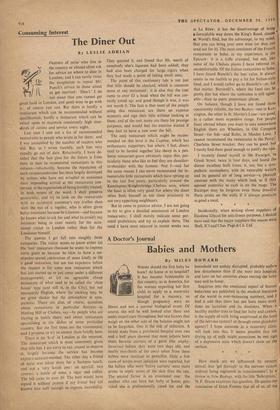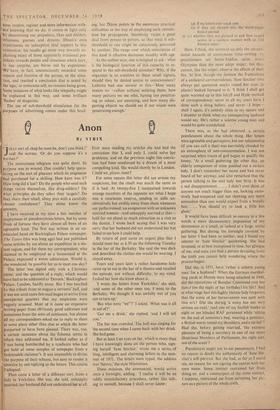A Doctor's Journal
Babies and Mothers
By MILES
HOWARD
WHERE should the first baby be born? At home or in hospital? It has become fashionable in this country, as in America, for the woman expecting her first child to apply to a maternity hospital for a vacancy, as though pregnancy were an illness and not a normal biological event. Of course, she will be well looked after there and under expert care throughout, but two factors that weigh on the other side of the balance ought not to be forgotten. One is the risk of infection. A recent study from a provincial hospital over two and a half years showed that most infants born there became carriers of a germ (the staphy- lococcus) before they were two days old, and nearly two-thirds of the cocci taken from these babies were resistant to penicillin. Only a few cases of severe overt infection were reported, but the babies who were 'heavy carriers' were more prone to septic states of the skin than the rest. The second factor is an emotional one: the mother who can have her baby at home, pro- vided she is professionally cared for and the
household not unduly disrupted, probably suffers less disturbance than if she went into hospital, and later on her anxieties about rearing the baby may well be fewer.
Inquiries into the emotional aspect of human behaviour are published in the medical literature of the world in ever-increasing numbers, and I find it odd that there has not been more work done on lactation and its disorders. When a healthy mother tries to feed her baby and cannot, is the supply of milk being suppressed at the level of the nervous system? or through some glandular agency? I hope someone in a maternity clinic will look into this. It seems possible that the drying up of milk might sometimes be one sign of a depressive state which doesn't show on the surface.
How much are we influenced by sensory stimuli that 'get through' to the nervous system without being registered in consciousness? In a review in New Biology, with the title `Subception; N. F. Dixon examines this question. He quotes the conclusion of Erich Fromm that all of us, all the time. receive, register and store information with- out knowing that we do; it comes to light only by determining our prejudices, likes and dislikes, Intuitions, guesses and dreams. Dixon's own experiments on subception lend support to this contention; his results go some way towards ex- plaining many of those apparently irrational pre- judices towards people and situations which later, to our surprise, are borne out by experience. We have, in fact, unconsciously recorded some aspects and features of the person, or the situa- tion, and reached a conclusion that is noted by the 'ego,' or conscious self, no reasons being given. Some instances of what looks like telepathy might be explained in this way, and some brilliant 'flashes' of diagnosis.
The use of sub-threshold stimulation for the purposes of advertising comes under this head- ing, but Dixon points to the enormous practical difficulties in the way of employing such stimula- tion for propaganda. Sensitivity varies a great deal from person to person, so that wht is sub- threshold to one might be consciously perceived by another. The range over which stimulation of this kind is effective decreases steadily with age.
As the author says, one is tempted to ask : what is the biological function of this capacity to re- spond to the sub-threshold stimulus? Why, if the organism is so sensitive to these small signals, should they be denied access to consciousness? Leibnitz had one answer to this—'How many insects we ',wallow without noticing them; how many persons we see who, having too penetrat- ing an odour, are annoying, and how many dis- gusting objects we should see if our vision were penetrating enough.'



























 Previous page
Previous page